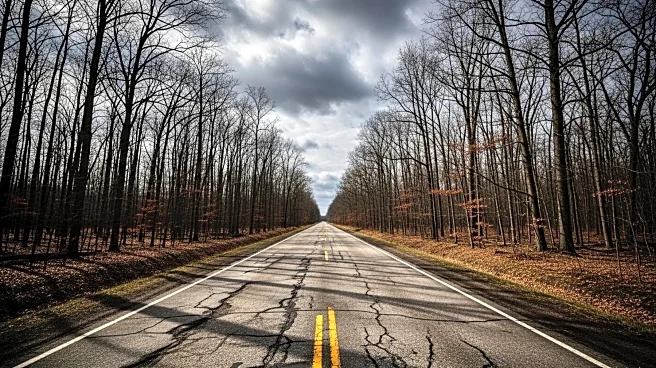What's Happening?
Francis Lawrence, known for his work on The Hunger Games, has directed a new adaptation of Stephen King's novel 'The Long Walk'. The film, featuring Cooper Hoffman, David Jonsson, Judy Greer, and Mark Hamill, presents a dystopian narrative set in a post-war America facing severe economic depression. The story revolves around a brutal contest organized by a military figure, 'The Major', played by Mark Hamill, where fifty young men must walk continuously at a pace of three miles per hour or face execution. The last survivor is promised a financial reward and a wish granted. The film focuses on the emotional and physical toll on the participants, highlighting themes of endurance and camaraderie amidst adversity.
Why It's Important?
This adaptation of 'The Long Walk' underscores the enduring appeal of Stephen King's narratives, which often explore human resilience in the face of oppressive systems. The film's release is significant for its commentary on societal issues such as economic hardship and authoritarian control, resonating with contemporary audiences. It also showcases the talents of emerging actors like Cooper Hoffman and David Jonsson, potentially influencing their future careers. The film's exploration of psychological and physical endurance may spark discussions on the impact of extreme conditions on human behavior, relevant to both historical and modern contexts.
What's Next?
Following its release, 'The Long Walk' is likely to generate discussions among critics and audiences regarding its portrayal of dystopian themes and its fidelity to King's original work. The performances of the cast, particularly Mark Hamill's role as 'The Major', may be scrutinized for their impact on the film's reception. Additionally, the film could influence future adaptations of King's works, encouraging filmmakers to explore his lesser-known stories. The societal themes presented may also prompt debates on the parallels between the film's narrative and real-world issues.
Beyond the Headlines
The film's depiction of a dystopian contest raises ethical questions about the lengths to which individuals might go for survival and the moral implications of such scenarios. It also reflects on the cultural fascination with dystopian narratives and their ability to mirror societal fears and challenges. The adaptation may contribute to ongoing discussions about the role of cinema in addressing complex social issues and the power of storytelling in shaping public perception.









